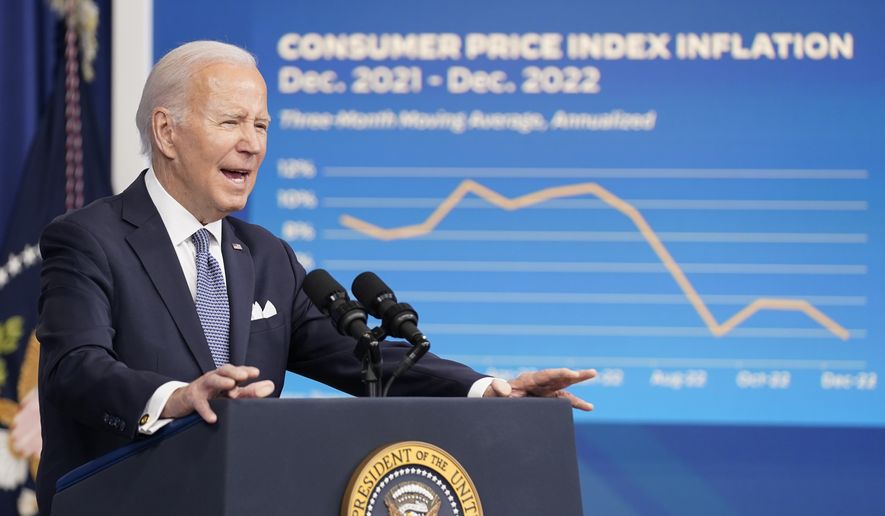President Biden vowed Thursday to veto bills from the new House Republican majority that would cut IRS funding for hiring more agents and create a national sales tax, saying the GOP’s plans would worsen inflation.
In what sounded like a campaign speech, Mr. Biden celebrated the reduction of inflation to a still-high 6.5% in December and said he was “disappointed” in the House GOP’s economic proposals.
The president said the proposal to cut tens of billions in IRS funding “would help wealthy people and big corporations cheat on their taxes at the expense of ordinary middle-class taxpayers.”
“If any of these bills make it to my desk, I will veto them,” Mr. Biden said at the White House. “I will flat veto them.”
The Consumer Price Index fell in December to its lowest level since October 2021, a drop from 7.1% in November and down from a record high of 9.1% last summer.
In 2020, before Mr. Biden took office, the annual inflation rate was 1.4%.
The president said one of the biggest reasons for the decline in inflation in recent months is falling gas prices.
“It all adds up to a real break for consumers,” Mr. Biden said. “Two years in, it’s clearer than ever that my economic plan is actually working.”
House Republicans also are pushing a bill to hold the Biden administration accountable for any action it takes that could add to inflation. The “REIN IN Inflation Act” would require the administration to take into account inflation before issuing any executive action.
It also would require the Office of Management and Budget and the chairman of the Council of Economic Advisers to issue an inflation-impact report for any action estimated to cost over $1 billion.
None of the proposals mentioned by the president is likely to pass in the Democratic-controlled Senate.
The newly divided Congress was the focus Thursday of U.S. Chamber of Commerce President and CEO Suzanne P. Clark, who said American business is “fed up” with a dysfunctional Washington making it harder for employers to hire enough workers and overcome red tape to complete projects.
In her annual address on the state of American business, Ms. Clark said business leaders are frustrated by several problems from Washington, including “the polarization, the gridlock, the overreach, the inability to act smartly or strategically for our future.”
“There are too many instances where government just isn’t working,” Ms. Clark said. “When a border crisis allows millions to cross illegally into this country, but we can’t get visas processed for engineers and nurses that businesses are desperate to hire and communities need, government isn’t working. When you’ve got the most significant new investment in infrastructure in a generation and businesses ready to build [but] the projects can’t get approved, government isn’t working.”
She said both parties bear responsibility for an uncertain business climate.
“We’re locked in this cycle of hyperpartisanship and political power swings,” Ms. Clark said. “Ten of the past 12 elections have been change elections. Both political parties promise they’ll do the big, hard things when they gain full control and can do it their way, without the give-and-take that comes from working across the aisle. The other party promises to undo those things when they get a majority in Congress, which often turns out to be the very next election. It means businesses don’t have the clarity or the certainty to plan past the next political cycle.”
The new Republican majority in the House, coupled with a Democrat-controlled Senate, could lead to progress because the most meaningful economic reforms are often bipartisan, she said.
She called for an “Agenda for American Strength” that includes speeding up permits for infrastructure and energy projects, fixing the immigration system and ramping up trade deals with nations such as Britain.
Chief among employers’ concerns is greater regulation by the Biden administration, she said.
She criticized rules “driven by ideological agendas and imposed on business without transparency, accountability or clarity.”
“Unprecedented regulatory overreach has accelerated over the past two years,” Ms. Clark said.
A recent review of the administration’s regulatory plan for 2023 found that costly new rules for business are rising at a rate likely to outpace the Obama administration’s regulatory speed. Part of the rise is due to Mr. Biden’s initiative to include the impact on climate change in all rule making.
• Dave Boyer can be reached at dboyer@washingtontimes.com.




Please read our comment policy before commenting.